Select Works of Thomas F. Torrance (21 vols.)
Digital Logos Edition
Overview
Thomas F. Torrance’s work regarding science and theology is a noted contribution to Christian apologetics and philosophy. Moreover, his work as a systematic theologian has also impacted those in the Reformed tradition. Torrance studied with Karl Barth in Basel, Switzerland early in his career, and was an editor for Barth’s Church Dogmatics and the translation of John Calvin’s New Testament Commentaries. This library collects Torrance’s thoughts about ecclesiology, the incarnation, and the relationship between science and theology, as well as his historical studies of Calvin’s view of man and the Church Fathers’ understanding of grace. Torrance’s works are filled with foundational concepts for Christians and are marked by his clear, inventive approach and a deep understanding of historical theology.
Torrance is lauded as one of the twentieth century’s most significant theological minds, and he wrote on a variety of subjects, breaking new ground in multiple disciplines. This collection provides a panoramic presentation of his works, including a practical guide, a philosophical view of Christian theology and scientific understanding, and a focused study of his theology’s effect on ecumenism. Better understand the meaning of the Incarnation and its role in removing dualism as an option for Christian believers. Read Torrance’s later works on the trinity, the mature gleanings from of a lifetime of theological meditation. Get to know Torrance’s thoughts and learn what doctrines he found to be most important for a Christian living as if God is present in the world he created.
Interested in T.F. Torrance? Check out the Princeton Monographs on T.F. Torrance (2 vols.).

Key Features
- Examines philosophical concepts such as epistemology and dualism
- Builds upon a deep knowledge of both John Calvin and Karl Barth’s theologies
- Integrates scientific insight with Christian doctrine and worldview
Praise for T.F. Torrance
Thomas F. Torrance is one of the premier theologians in the second half of the twentieth century.
—Elmer Coyer, How to Read T.F. Torrance: Understanding His Trinitarian & Scientific Theology
Product Details
- Title: Select Works of Thomas F. Torrance
- Author: Thomas F. Torrance
- Publisher: Wipf & Stock
- Volumes: 21
- Pages: 4,618
- Christian Group: Reformed
- Resource Type: Collected Works
- Topic: Theology
Individual Titles
- Gospel, Church, and Ministry by Thomas F. Torrance
- Kingdom and Church: A Study in the Theology of the Reformation by Thomas F. Torrance
- Conflict and Agreement In the Church, Volume 1 by Thomas F. Torrance
- Conflict and Agreement In the Church, Volume 2 by Thomas F. Torrance
- The School of Faith by Thomas F. Torrance
- A Passion for Christ: The Vision that Ignites Ministry by Thomas F. Torrance, James B. Torrance, and David W. Torrance
- The Doctrine of Jesus Christ: The Auburn Lectures 1938/39 by Thomas F. Torrance
- When Christ Comes and Comes Again by Thomas F. Torrance
- The Christian Frame of Mind: Reason, Order, and Openness in Theology and Natural Science by Thomas F. Torrance
- Belief in Science and in Christian Life: The Relevance of Michael Polanyi’s Thought for Christian Faith and Life edited by Thomas F. Torrance
- Christian Theology and Scientific Culture by Thomas F. Torrance
- Theological and Natural Science by Thomas F. Torrance
- Transformation and Convergence in the Frame of Knowledge: Explorations in the Interrelations of Scientific and Theological Enterprise by Thomas F. Torrance
- Juridical Law and Physical Law: Toward a Realist Foundation For Human Law by Thomas F. Torrance
- Reality and Scientific Theology by Thomas F. Torrance
- Reality and Evangelical Theology: The Realism of Christian Revelation by Thomas F. Torrance
- Theology in Reconstruction by Thomas F. Torrance
- Calvin’s Doctrine of Man by Thomas F. Torrance
- Theology in Reconciliation: Essays Towards Evangelical and Catholic Unity in East and West by Thomas F. Torrance
- The Incarnation: Ecumenical Studies in the Nicene-Constantinopolitan Creed edited by Thomas F. Torrance
- The Doctrine of Grace in the Apostolic Fathers by Thomas F. Torrance
This title is included in the following collections
You can save when you purchase this product as part of a collection.
Logos 8 Lutheran Diamond Legac...
$2,999.99$2,999.99Logos 8 Reformed Diamond Legac...
$2,999.99$2,999.99Logos 9 Lutheran Diamond Legac...
$2,999.99$2,999.992025 Reformed Portfolio
$4,749.99$3,562.49
- $4,749.99
- $4,749.99
- $4,749.99
- $11,593.84$8,499.99
- $23,999.99$17,999.99
- $21,749.99
- $24,999.99
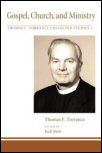
Gospel, Church, and Ministry
- Author: Thomas F. Torrance
- Editor: Jock Stein
- Series: Thomas F. Torrance: Collected Studies
- Publisher: Wipf and Stock
- Publication Date: 2012
- Pages: 292
The best writing is relevant for every age. C.S. Lewis reminded his readers that we must always read books from different eras, to avoid our own generation’s blind spots. These articles by Professor T.F. Torrance, Scotland’s world famous theologian, merit reading.
These particular articles focus on the topics of church and ministry in light of the gospel of Christ. They have been selected, first, because they illustrate how Torrance understood his work as an academic theologian to be the calling of an evangelist to the church and to the intellectual life of the day, and, second, because they are on the whole more accessible to the average reader. An introduction by Jock Stein relates the different chapters to Torrance’s overall work, the development of his thought, and to the events of his time.
Students of T.F. Torrance will be most grateful to read his memoirs and essays on pastoral ministry and theology, which rightly constitute volume one of a new and significant series. Accessible essays make clear Torrance’s basic concern for the church in witness, mission, and service of Jesus Christ.
—Dr. Todd H. Speidell, editor, Participatio: The Journal of the Thomas F. Torrance Theological Fellowship
If we need a concrete witness to Thomas F. Torrance’s conviction that faithful theology really does directly feed faithful service then this volume of essays and addresses by Torrance himself profoundly attests to it. This collection alone exhibits much of what is needed in a ‘practical theology’ for the worship, witness and ordered life of the church of Jesus Christ.
—Rev. Dr. Gary W. Deddo, senior editor, InterVarsity Press Academic (USA)
Jock Stein has done a great service by compiling this selection of TFT’s papers on themes of the church and ministry. . . This and the projected further volume(s) will make key outlines of Torrance’s theology much more accessible and deserve to be widely used.
—Dr. Alasdair Heron, professor emeritus, University of Erlangen-Nuremberg
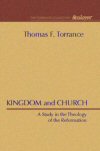
In this book, T.F. Torrance’s doctrine of “the vicarious humanity of Christ” addresses the problem of the reality of salvation. Through this approach, salvation as humanization is affirmed, yet without the problems of anthropocentric theologies. This book is unique in that it offers both a survey of contemporary Christian thinking on salvation as well as a constructive alternative based on Torrance’s doctrine, a significant yet neglected contribution to modern theology.
Even when we acknowledge its modest limits, it is difficult to imagine how this little book can fail to be judged, and to take a well deserved place, as a significant and highly valuable addition to the exciting and growing corpus of contemporary Reformation writings.
—Robert Clyde Johnson, Theology Today
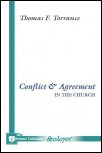
This compelling collection of essays, articles, and article reviews arise directly or indirectly out of Torrance’s involvement in the ecumenical movement.
Torrance writes, “Ours must be the task of learning together again how to confess, like the early Church, faith in Jesus Christ as Saviour and God in all its breadth and length and height and depth, and therefore in the overflowing love of God. Only in glorification of God the Son and in actual encouragement of the Gospel can we produce, as a paragon, a doctrine of the Church in which our differences are lost sight of because they are destroyed from behind by a masterful faith in the Saviour of men.”
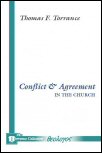
This second volume of Conflict and Agreement In the Church is another collection of essays, articles, and article reviews that arose directly or indirectly out of Torrance’s involvement in the ecumenical movement. These carefully considered works highlight Torrance’s thought on inter–denominational cooperation in light of the Church’s mission.
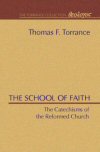
The School of Faith: The Catechisms of the Reformed Church
- Author: Thomas F. Torrance
- Series: The Torrance Collection
- Publisher: Wipf and Stock
- Publication Date: 1996
- Pages: 422
With this book, Thomas Torrance gathers together in a single volume all Catechisms officially authorized and employed by the Church of Scotland since the Reformation, so that they may be conveniently studied together. His historical study is of great benefit to modern readers of Reformed theology.
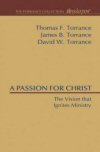
A Passion for Christ: The Vision that Ignites Ministry
- Authors: Thomas F. Torrance, James B. Torrance, and David W. Torrance
- Series: The Torrance Collection
- Publisher: Wipf and Stock
- Publication Date: 2010
- Pages: 154
In a culture increasingly secular in its pursuits and indifferent to the voice of the church, how may we ignite the fire for ministry that will bring the gospel to the world? How can weary pastors be sustained amidst a climate of doubt and resistance?
For more than half a century, three remarkable brothers have offered a vision that has inspired thousands in churches and seminaries. Today, their message remains fresh and relevant as we enter a new millennium. And for one reason: The Brothers Torrance share a passion for Christ—the Christ of the Scriptures, the Christ of the historic Nicene faith.
These essays distill the essence of their thought, and shine with the clarity of their shared vision. A Passion for Christ is a light of encouragement for ministers and lay people elsewhere.
The whole practice of ministry flows from our union with Christ in his priesthood--and this is the Torrance’s theology of the Christian life.
—Andrew Purves, Pittsburgh Seminary
David W. Torrance is a Presbyterian minister in the Church of Scotland. He studied theology with Karl Barth.
James B. Torrance (1923–2003) was professor of systematic theology at the University of Aberdeen.
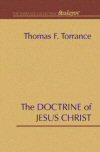
The Doctrine of Jesus Christ: The Auburn Lectures 1938/39
- Author: Thomas F. Torrance
- Series: The Torrance Collection
- Publisher: Wipf and Stock
- Publication Date: 2001
- Pages: 208
These lectures were presented in 1939 at Auburn Seminary where Torrance was a professor. This event happened immediately after his stint in Basel, Switzerland when he studied with Karl Barth. Readers will find Torrance’s teaching on Christ imminently helpful and filled with clear doctrinal points.
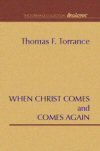
It is one of the principle tasks of the theologian in each generation to bring the preaching of the church to the bar of the word of God and to test its adequacy as a faithful presentation of the message and teaching of the New Testament. Torrance intended this volume to help evangelists to rethink the content of their proclamation in order to let the Word of God have free course in their ministry.
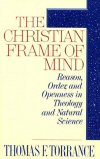
The Christian Frame of Mind: Reason, Order, and Openness in Theology and Natural Science
- Author: Thomas F. Torrance
- Publisher: Wipf and Stock
- Publication Date: 2010
- Pages: 164
An exhilarating exploration by one of the century’s premier theologians of the relationship between science and theology. This collection of essays, which focuses on the themes central to Thomas F. Torrance’s life-long work of integrating Judeo-Christian theology and natural science, illuminates the distinctive contribution of the Christian frame of mind to human life and thought particularly in the rise of modern science.
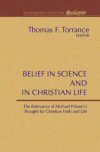
This focused collection consists of the lectures from a conference held in 1978 at St. Catharine’s, Cumberland Lodge, Windsor. Torrance’s stated intentions are to revisit Christian convictions in light of scientific progress and to reference the writing of Michael Polanyi, "one of the greatest scientist-philosophers of our age." This work is written for a wide popular audience and in an accessible style, making technical minutia clear and bringing lofty concepts within reach.
Contents and Contributors:
- “The Framework of Belief” by Thomas F. Torrance
- “Indwelling: Formal and Non-Formal Elements in Faith and Life” by John C. Puddefont
- “Conversion and Penitence” by John Barr
- “Christian Affirmation and the Structure of Personal Life” by Daniel W. Hardy
- “The Truth of Christology” by Colin E. Gunton
- “Providence and Prayer” by Peter Forster
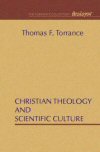
How do we react to the claim that physics must now be regarded as one of the liberal arts, for in its description of the universe it sets the stage for the drama of human life? If modern science has now become the dominant culture, how does Christianity look within it? What difference does the Christian idea of the contingence of nature make to science today? What difference does it make for Christian thought and culture to move away from the old idea of the world as a closed mechanical system of cause and effect into the new idea of the world as an open dynamic system configured by the behavior of light, the fastest messenger in the universe? These are some of the questions discussed in the light of James Clerk Maxwell’s discoveries of the mathematical properties of light, and of Albert Einstein’s generalization of the new understanding of light for a radically new and exciting view of nature that has made space travel possible and enabled us to trace the expansion of the universe back to conditions near its beginning.
This is not a defensive book about science and religion in the usual vein. It is concerned rather with the deep mutual relation and respect of Christian and scientific thought for each other, and shows how this relationship throws new light upon basic Christian doctrines. This volume also warns against the dangers of a reactionary retreat from the rigors of scientific thought into fuzzy mythological interpretations of the incarnation, and calls for a deeper appreciation of the Nicene Creed upon which all Christendom rests.
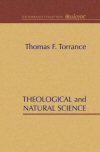
This classic study establishes a sound theological base for the future of philosophical science. Torrance’s view was that science needs theology to properly maintain a requirement for contingency and to avoid ascribing eternality to the cosmos. Because scientific exploration is limited in its ability to know all things, Torrance argues for theological science. In order to avoid error, he argues for scientific theology.
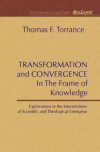
The essays which make up this volume arise out of the author’s ongoing engagement with the tension between Christian theology and the general frame of thought that has dominated European culture for several hundred years. The early Christian Church set about not only to communicate the Gospel to the Greco-Roman world but also to transform the prevailing mode of thought and culture so that the Gospel could take deep root and develop within it. Therefore, in every age, says Thomas F. Torrance, “the Christian faith must be brought to bear transformingly upon the whole frame of human culture, science, and philosophy.”
A creative and rigorous overcoming of epistemological dualism in modern thought, Torrence’s work is a major contribution to post-critical scholarship and a new partnership between science and theology.
—Richard Gelwick, Journal of the American Academy of Religion
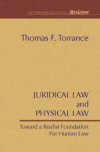
This book challenges jurists and parliamentarians to reconsider the foundations of the legal and political institutions in Britain, which are shown to be seriously wanting. The author believes that judicial decisions in favor of justice are set aside by appeal to statutory enactments of Parliament slanted by party-political prejudice.
If the Reformed natural law tradition is to be rediscovered and rehabilitated after Barth, it will have to be done in deep conversation with Barth. This sort of rapprochement between Barth and the greater Reformed tradition on these questions might be pursued through a consideration of Thomas F. Torrance’s epistemological realism. Indeed, Torrance appears to move in this direction in his short work entitled Juridical Law and Physical Law.
—W. Travis McMaken, professor, Lindenwood University
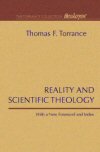
In this book, T.F. Torrance argues for a rigorous scientific theology under the double constraint of the reality of God and the reality of the world of space and time. Careful attention is given to the common commitment of theological and natural science to objective knowledge, and the deeply natural relation between knowledge of God the Creator and knowledge of the world he has made. He stresses the stratified structure of theology and the need for a radical simplification and unification of Christian doctrine.
Is theology the “science of God”, and is it concerned with objective knowledge like natural science? Is there a natural theology and how is it related to knowledge of God through divine relation? How is the community of faith within which dogmatic theology arises related to the social coefficient of scientific inquiry? What is the place of mysticism and of art in theology? Does theology have a special notion of truth, and does it have its own inner logic and structure? These are some of the main questions which this book seeks to answer.
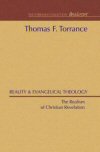
T.F. Torrance is widely recognized as one of our most important twentieth-century theologians. Scholars of Torrance suggest that Reality & Scientific Theology is one of his most accessible works.
Torrance’s insights on Christian epistemology are remarkably relevant in light of recent discussions on realism and anti-realism in philosophy and theology. Torrance brilliantly sets forth no naive or even critical realism, but rather an evangelical realism—knowledge grounded in the revelation of God in Jesus Christ. He not only constructively argues the case for an evangelical realism but compares and contrasts theological knowledge with natural scientific knowledge, and shows how the Bible can function authoritatively in a fragmented church.
This edition of Reality and Evangelical Theology includes an in-depth foreword that contextualizes Torrance’s seminal theological work in light of recent debates over postmodern and postcritical hermeneutics to Scripture. It will handsomely repay engagement (or reengagement) by theologians, philosophers, students and thoughtful pastors.
This is a very impressive effort to bring together various oft-partisan themes into a fuller vision of the meaning of revelation. . .
—Gabriel Fakre, Theology Today
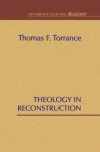
This collection of fifteen essays addresses the basic intellectual challenges to the contemporary Christian church. Professor Torrance deals with such topics as the centrality of Christology in scientific dogmatics, the Reformed and Roman Catholic doctrines of grace, theological education, the relation of theological statements to scientific methodology, the contemporary significance of some past theological giants, and the nature and significance of the Holy Spirit and of the church.
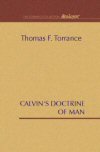
T.F. Torrance’s Calvin’s Doctrine of Man contains chapters entitled “Man’s Knowledge of Himself,” “Man’s Place In Creation,” “The Image of God,” “Total Perversity,” “Natural Theology,” and others. This theology—rich book reflects on the doctrinal position of celebrated reformer, John Calvin, regarding mankind. Glean from this modern scholarship built upon traditional writing within the Reformed tradition.
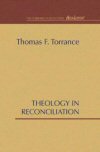
Theology in Reconciliation: Essays Towards Evangelical and Catholic Unity in East and West
- Author: Thomas F. Torrance
- Series: The Torrance Collection
- Publisher: Wipf and Stock
- Publication Date: 1996
- Pages: 303
Dealing with the issue of church unity and the ecumenical movement, Professor Torrance reminds Christians in a collection of essays that any theology which is faithful to the gospel must be a theology of reconciliation.
. . . If Torrance is right, we are in for a new phase in ecumenical relations. Not merely a new page is to be turned—a new book is to be opened!
—Dietrich Ritschl, Ecumenical Review
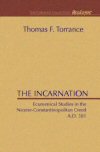
This book is a collection of papers from the conference of the International Academy of Religious Sciences held in Norwich in 1978. The theme is the Incarnation in relation to the Nicene-Constantinopolitan Creed. The book is an ecumenical contribution to theological discussion of a theme that has once again become a burning issue. Contributors include theologians from the Orthodox, the Roman Catholic, and the Anglican Churches as well as the Church of Scotland.
Contents and Contributors:
- “The Homoousion” by Archbishop Methodios
- “The Eternal Son” by G.D. Dragas
- “Homoousios with the Father” by A.I.C. Heron
- “Christ and Creation” by D.W. Hardy
- “The Virginal Birth of Christ” by A. Houssiau
- “The Vicarious Humanity of Christ” by J.B. Torrance
- “Incarnation and Atonement” by J.H. Walgrave
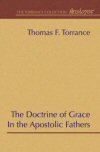
The Doctrine of Grace in the Apostolic Fathers
- Author: Thomas F. Torrance
- Series: The Torrance Collection
- Publisher: Wipf and Stock
- Publication Date: 1986
- Pages: 158
In this book, T.F. Torrance aims to discover how and why an enormous difference came about in the early history of the Christian Church between the faith of the New Testament and that of the second and third centuries. He explores how the concept of grace is distinctively characteristic of every doctrine of the New Testament, and yet at the same time is the most changeable.
Dr. Torrance has produced a sound and scholarly study of charis, word and idea, in the Apostolic Fathers, with a valuable introduction on the earlier history of the word and its New Testament usage.
—E.R. Hardy Jr., Theology Today
About Thomas F. Torrance
Thomas F. Torrance (1913-2007) was one of the most important Reformed theologians of his era. Known for his own considerable efforts in Christian theology, Torrance also notably served as one of the editors for Karl Barth’s Church Dogmatics. He has authored several works, including Divine and Contingent Order, Ground and Grammar of Theology, Space, Time and Incarnation, and The Christian Doctrine of God, One Being Three Persons.
Torrance was born in China in 1913 to missionary parents. For nearly 30 years until his retirement in 1979 he was professor of Christian dogmatics (“systematic theology”) at the University of Edinburgh, Scotland. A prolific writer on many topics, he published numerous books and papers on the "Philosophy of Theology" dealing with the epistemology of theological concepts and with the relation of theology to natural science. In 1976 to 1977 Torrance served as moderator of the General Assembly of the Church of Scotland, and in 1978 he was awarded the Templeton Prize for Progress in Religion.
Reviews
5 ratings
William Corbett
10/22/2024
Gary Deddo
9/23/2021
Matthew Bostwick
11/14/2019
Would love to see a few more key works in this collection! * Mediation of Christ * Atonement * IncarnationJerome Smith
12/6/2017
I have been reading the works of Hendrik Kraemer. Today I was reading his volume, The Theology of the Laity. Dr. Kraemer refers to the work of Torrance several times. On that basis alone I determined that the works of Torrance were worth getting. I even went back downstairs to my reading chair to verify I had remembered correctly that Kraemer cited Torrance. My memory was correct, so I'm in on the pre-publication offer for this marvelous collection.Brian Miller
9/1/2015
I am really looking forward to this collection. But to say in the description that Torrance "has authored several works..." seems to be quite of an understatement. Nevertheless, I am looking forward to this collection.
Ian Carmichael
8/6/2015
A remarkable body of work from one person. Greatly underestimated in my view. Solid, detailed, chaleenging thinking and reading.